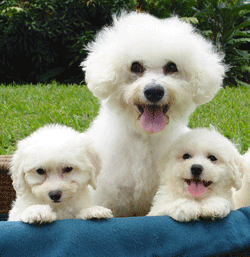Bichon Frise – The Happy & Sociable Fur Ball!
The Bichon Frise dog generally makes an excellent addition to any household. He is friendly and sweet and provides few major challenges.
General Appearance and Description
 If you like puffy, fuzzy dogs, the Bichon Frise is for you. This cute little fur ball is identified mostly by color and fur characteristics. His color is usually all white, but some dogs have other colors mixed in, most commonly grey, apricot, and cream.
If you like puffy, fuzzy dogs, the Bichon Frise is for you. This cute little fur ball is identified mostly by color and fur characteristics. His color is usually all white, but some dogs have other colors mixed in, most commonly grey, apricot, and cream.
His coat is long and curly. The Bichon Frise is virtually hypoallergenic, so this makes him a desirable pet to many people with animal allergies or sensitivities.
Basic Temperament
Bichon Frise dogs are extremely social. They love people and being around many humans. They are affectionate, intelligent, independent and spirited. Though they are small, they’re not yippy dogs that will annoy you and the neighbors.
Most Bichon Frise dogs are happy and confident, and cause no problems to their household. They enjoy meeting new people and are good with children and older people. They thrive on making sure that others are happy, so their happiness in a household situation is directly tied to that of their owner. If you’re happy, they’re happy.
The Bichon Frise do like being companion dogs, so they enjoy being taken along when you go somewhere.
Care Required
Bichon breeders will tell you that the care of a Bichon is simple and they are partly right. Most Bichon Frise dogs should be bathed every month, and groomed professionally every four weeks. Because the fur is curly and full, it can get out of hand if not kept trimmed.
The eye and ear areas should also be trimmed with blunt scissors on a regular basis and the eyes should also be cleaned periodically to prevent staining since the eyes tend to run.
Best of all, however, is that Bichon puppies and dogs do not really shed, which is what makes this breed particularly good for those who suffer allergies.
Exercise Requirements
Bichon Frise puppy exercise needs are quite similar to the breed’s needs when he’s full grown. They are extensive. While you might not think that such a small dog would have high activity needs, the opposite is true. He is a very active dog that needs a daily walk and plenty of play time.
While the Bichon is not a troublesome dog, if he’s not exercised enough, he might challenge your patience with some behavior problems. A walk a day is all they ask, but if you can also find your way to a dog park now and then, these dogs will appreciate it. They will enjoy the social element as well as the ability to run free for a bit.
Training
It’s important that you set yourself up as the boss of the house (or the “alpha dog”). The Bichon needs limits and rules. He needs to know that someone is in charge.
If this leadership is not established early, the dog can develop “small dog syndrome” where the small dog feels that he is the leader of the humans. This can lead to problems like biting, separation anxiety and snapping. It’s brought on when the humans in the dog’s life don’t respond appropriately to him. If you establish yourselves as the leader, you should have no trouble with this.
Some Bichon Frise dogs can be hard to housebreak.
Height and Weight
Male dogs are usually about 9 to 12 inches tall, while females are between 9 and 11 inches tall. They weigh between 7 and 12 pounds.
Health and Longevity
These dogs don’t suffer too many health problems, aside from watery eyes, some skin and ear ailments, and cataracts. All of these are common canine health problems. Some Bichon Frise dogs can suffer from epilepsy and problems with their knees. In general, the Bichon lives for about 15 years or more.
Suitability
These dogs are ideal for just about any household environment. They are ideal for households with children and older people. They enjoy having other dogs and even cats around, but will do fine if they are the only pet in the household as well. They enjoy seeing themselves as watch dogs, but their ability to really impact the household that way is debatable.
More Information
Further information about the Bichon Frise can be found here.



